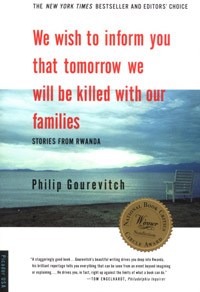By Philip Gourevitch
 This is a stunningly poignant and unsettling book.
Using personal anecdotes interspersed with a chronological history, Gourevitch
creates a comprehensive study of the Rwandan massacre and surrounding
events in the mid-1990s. The emphasis on individual stories evokes a Diary
of Anne Frank intimacy, necessary for a conflict most Americans
hardly know anything about. The graphic and clear depiction of events
makes lucid the complex web of actors and locations, building layer upon
layer to create a robust picture of the situation.
This is a stunningly poignant and unsettling book.
Using personal anecdotes interspersed with a chronological history, Gourevitch
creates a comprehensive study of the Rwandan massacre and surrounding
events in the mid-1990s. The emphasis on individual stories evokes a Diary
of Anne Frank intimacy, necessary for a conflict most Americans
hardly know anything about. The graphic and clear depiction of events
makes lucid the complex web of actors and locations, building layer upon
layer to create a robust picture of the situation.
Gourevitch blows apart Western myths about the conflict as inevitable,
and is not reluctant to place blame in the hands of the region’s
past colonial masters for inventing the racist theories that permeated
the country and manifested hatred between Hutus and Tutsis. The last
third of the book is the most heartbreaking, as Gourevitch describes
the great failure of the rest of the world to intervene. Shockingly,
when humanitarian organizations finally got involved they often sided
with the perpetrators, and inadvertently worsened the conditions of thousands
of refugees.
Gourevitch sticks with several main characters, each sharing a different
aspect of the conflict. Early on in the book, we empathize with a Tutsi
doctor not allowed to care for either Tutsi or Hutu victims. Gourevitch
manages to get close to several key leaders, and lay bare their motivations.
And we learn of one of the most appalling acts imaginable, as a Hutu
priest hides dozens of Tutsi families in his church, only to betray them
to his Hutu superiors. The title of the book comes from a letter the
petrified victims wrote to the priest, begging for his mercy, but to
no avail.
As morbid and frightening as the subject matter is, Gourevitch consistently
uses the stories to demonstrate the potential for human dignity to rise
above these horrors. A particularly uplifting story features a hotel
owner who used his connections to turn a media spotlight onto his building,
turning it into a temporary haven and giving him time to smuggle out
Tutsi children to safer areas.
Studying a particular conflict such as this one is universally essential.
A reminder that the deplorable nadir of the Holocaust can be repeated
in our modern age – as recently as a few years ago – is a
powerful motivator to generate support for peace processes worldwide.
The power of this book lies not in its effective description of the history
of the central African conflict, but in its examination of the psychological
justifications for evil acts that all people are capable of, and its
exposure of the blood on the hands of all of us in our nonchalance.